Fresno State will receive additional emergency funding with the Higher Education Emergency Relief Fund (HEERF II) through the signed American Rescue Plan Act of 2021.
The university will receive approximately $52 million, and about $25 million of that will be distributed to students beginning the week of April 5, Interim President Saúl Jiménez-Sandoval said in a press release on Tuesday.
The American Rescue Plan Act of 2021 was signed into law on March 11. HEERF II will appropriate $39.5 billion for institutions of higher education through 2023. The California State University system in total is receiving $845 million.
Students are not required to have a completed Free Application for Federal Student Aid (FAFSA), and there is no application to receive this funding as it’ll be automatically awarded.
Jiménez-Sandoval said the grant amount will be determined based on student status (part-time or full-time) and one’s estimated family contribution (EFC).
During the March 10 Fresno State Associated Students Inc. (ASI) senate meeting, Jiménez-Sandoval announced the university would receive a second round of federal funding from HEERF II during the upcoming spring break.
“We are planning to distribute $25 million to our students right after spring break. About 95% of our students will receive financial aid through the federal government,” Jiménez-Sandoval said.
In the senate meeting on March 10, Jiménez-Sandoval acknowledged that DACA (Deferred Action for Children Arrival) and international students will not be eligible to receive federal financial aid from HEERF II similarly to the previous year.
“DACA and international students are not included in this money, but we found other ways to also secure funding for them as well. In the end we are pretty confident that most of the students, if not all, will receive help from financial aid,” Jiménez-Sandoval said.
Jiménez-Sandoval noted that because of the American Rescue Plan the university secured an additional $46 million in federal aid extending HEERF until 2022 with a spending deadline of 2023.
CSU Chancellor Joseph I. Castro stated in a press release on March 11 that the additional funding will provide assistance to students who are facing financial hardships such as food and housing insecurity.
“With 50% of students who come from low-income households (as defined as Pell-eligible), the emergency financial grant aid will help them cope with the financial strain caused by the pandemic,” Castro said.
The bill will also help the CSU recover from the financial struggles it faced during the pandemic such as revenue losses and expansion of technological services that have helped students with wireless hotspots and computers.
Written by Edward Lopez and Jannah Geraldo




